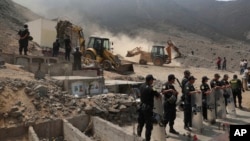Peruvian authorities on Saturday demolished a mausoleum holding eight Shining Path rebels killed during prison massacres more than three decades ago and relocated their remains to a cemetery in a northern part of Lima.
More than 50 police officers and dozens of workers from the cemetery in the Comas district of Peru's capital participated in the operation, said prosecutor Javier Zapata. The remains of the Maoist rebels will be buried in separate niches.
The rebels died in June 1986 riots in three prisons in Lima during which security forces killed 250 suspected Shining Path inmates. Prisoners killed three soldiers and one police officer.
In 2013, prosecutors accused 35 members of Peru's navy of homicide and carrying out extrajudicial executions during the riots, and requested 25- to 28-year sentences. The case is ongoing. The inmates' bodies were burned and buried clandestinely after the massacres but were exhumed by a forensic team starting in 2012.
The remains of the eight rebels were the first to be returned to their families. The other remains have not yet been returned.
The mausoleum was built in 2016 by relatives of the dead rebels and was designed to hold up to 51 niches. Conservative parties in Peru and members of the military objected to it as an apology for terrorism and called for it to be taken down. Authorities say its construction was begun without the necessary permits.
A handful of relatives of the dead rebels protested at the cemetery's gates but managed to enter only after the mausoleum had been torn down.
“I felt impotence, indignation and anger; the state doesn't even let the dead rest in peace,'' said Elviro Aponte, 80, father of one of the rebels.
Experts says there are 6,462 clandestine cemeteries throughout Peru, a legacy of the Andean nation's brutal internal conflict. A truth commission found that between 1980 and 2000, fighting among rebel groups, the government and self-defense patrols left up to 70,000 dead.





